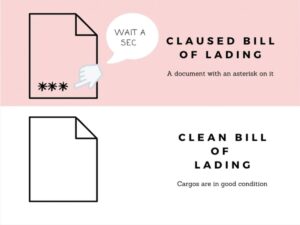Banks that deal in letters of credit insist on clean bills of lading. A clean bill of lading is one that does not have any clauses attached to it. In other words, the goods are without any encumbrance, defects, or shortage. Along with this, all other documents, such as the invoice for the goods and related certificates, have to be accurate for the issuing bank to accept them.

A claused bill of lading, on the other hand, will have notations that highlight shortages or damages to the goods that were delivered to it by the shipper and loaded on board. It is also called a dirty or foul bill of lading. For a bank to accept the shipping documents as correct, such a claused bill of lading will not do.
That brings us to the question of shipping companies issuing bills of lading with some showing the notation shipped on board while others state ‘clean on board’. The latter is more specific and signifies that the goods were received in good condition without any clauses.
Read Also: Manpower Development: NPA To Reopen Training School Soon, Says Bello-Koko
When a bill of lading does not show the shipped on board date on it, the normal practice is to take the bill of lading date as the shipped on board date. It will therefore be assumed that the goods were loaded on board the vessel on the date of issue of the bill of lading.
Kindly like us on Facebook
















Discussion about this post